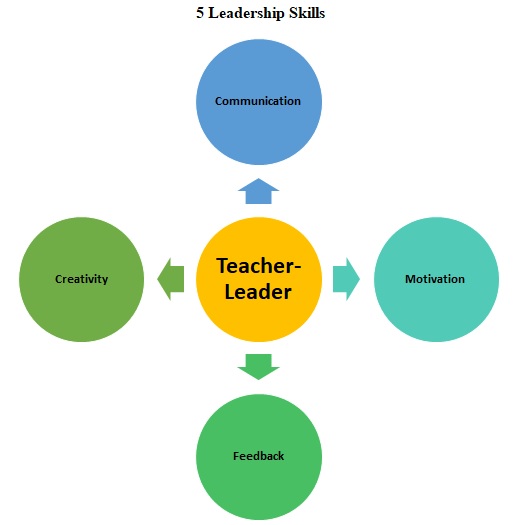
Teacher leadership – 5 must-have & courses to take
Teacher leadership is a valuable component of educational improvement because it harnesses the expertise and experience of classroom teachers to drive positive changes in education systems. It recognizes that teachers are not only instructional experts but also agents of change who can contribute to the betterment of their schools and the broader educational community. Want to explore how and where to improve teacher leadership, let’s dive into this article.
What is teacher leadership?

Teacher leadership refers to the role that teachers can play in influencing and shaping educational practices and policies beyond their traditional classroom responsibilities. It involves teachers taking on leadership roles and responsibilities within their schools, districts, and the broader education community to improve teaching and learning. Teachers who possess teacher leadership often act as advocates for students, facilitate professional development, and contribute to the overall improvement of education.
5 must-have for teacher leadership
Teacher leadership involves a combination of skills, qualities, and attributes that enable educators to effectively lead within the educational context. Here are five essential qualities and skills that are often considered must-haves for teacher leadership:
Strong Communication Skills is the No.1 teacher leadership ‘s key point:

Effective teacher leaders are excellent communicators. They can articulate their ideas, concerns, and goals clearly and persuasively to various audiences, including colleagues, administrators, parents, and policymakers. They listen actively, empathize with others’ perspectives, and foster open and constructive dialogue.
Collaboration and Teamwork:

Teacher leaders must collaborate with diverse groups of stakeholders, including fellow teachers, administrators, students, parents, and community members. They need to build and maintain positive working relationships, facilitate teamwork, and foster a collaborative culture within their school or district.
Instructional Expertise:

Teacher leaders are respected for their instructional knowledge and expertise. They should continuously develop and refine their teaching skills, stay current with educational research and best practices, and serve as role models for effective teaching in their classrooms.
Problem-Solving and Critical Thinking:

Teacher leaders often encounter complex challenges in education. They should possess strong problem-solving and critical thinking skills to analyze issues, identify solutions, and make informed decisions. The ability to adapt to changing circumstances and think creatively is crucial.
Adaptability and Resilience:

Educational environments are dynamic, and teacher leaders need to adapt to evolving educational trends, policies, and technologies. They should demonstrate resilience in the face of setbacks and remain committed to their goals despite obstacles.
In addition to these qualities and skills, it’s important for teacher leaders to be passionate about education and dedicated to the well-being and success of their students. They should also be aware of the larger educational landscape, including policy developments, and be willing to advocate for positive change. Finally, an understanding of ethical leadership and a commitment to equity and inclusivity are also highly valuable for teacher leaders to make a meaningful impact on their schools and communities.
Leveraging new era of world today to improve teacher leadership

Taking advantage of the new era of the world today to upgrade teacher leadership involves embracing technological advancements, recognizing the changing educational landscape, and harnessing the power of collaboration and communication. Here are several strategies to help educators enhance their teacher leadership roles in this evolving era:
Utilize Technology for Professional Development:
Embrace online platforms, webinars, and e-learning courses to expand your professional development. Access resources, attend virtual conferences, and participate in online communities to stay up-to-date with the latest educational trends and best practices.
Connect with educators globally through social media platforms, online forums, and professional networks. Collaborate on projects, share resources, and engage in discussions to exchange ideas and experiences. Besides, be advocate for equitable access to technology and digital resources for all students. Raise awareness of the digital divide and work with your school or district to ensure that every student has access to the tools they need to succeed.
Data-Driven Decision-Making:
Learn to use educational data effectively. Understand how to analyze assessment results, track student progress, and make data-informed decisions to improve teaching and learning outcomes.
Cultivate Innovative Teaching Practices:
Experiment with innovative teaching methods, such as blended learning, flipped classrooms, or project-based learning. Share your successes and challenges with your colleagues and encourage them to explore new approaches.
Global Perspective for better Teacher Leadership:
Encourage a global perspective in your classroom by incorporating multicultural and global education themes. Foster global awareness and understanding among your students, preparing them for an interconnected world.
By proactively engaging with the new era of education, embracing technology, and fostering collaboration, teacher leaders can have a profound impact on their schools and communities. This approach not only benefits individual educators but also contributes to the overall advancement of education in a rapidly changing world.
Useful recommendations to improve teacher leadership

Improving teacher leadership often involves a combination of formal education, professional development opportunities, and practical experiences. Here are some recommendations for courses and avenues that can help educators enhance their teacher leadership skills:
Master’s Degree in Educational Leadership or Administration:
Pursuing a master’s degree in educational leadership or administration is a common path for teachers looking to develop their leadership skills. These programs typically cover topics like school leadership, curriculum development, and educational policy.
Teacher Leadership Graduate Programs:
Some universities offer specific graduate programs or certificates in teacher leadership. These programs focus on empowering teachers to take on leadership roles within their schools and districts.
Offline/Online Courses and Workshops:
Many online platforms offer courses and workshops related to teacher leadership. Websites like Coursera, edX, and LinkedIn Learning offer a variety of options. Look for courses on topics such as educational leadership, communication skills, and data-driven decision-making.
Or you can visit: Language Link Academic to be equipped with the skills and knowledge to teach English to children and adolescents in the age range 7-16, especially teacher leadership with various activities and practical experience.
Professional Learning Communities (PLCs):
Join or form professional learning communities within your school or district. These collaborative groups of educators work together to discuss best practices, share resources, and engage in peer coaching and mentoring.
Leadership Books and Resources:
Read books and articles on leadership in education. Explore resources from organizations like the National Teacher Leadership Institute and the National Association of State Boards of Education (NASBE).
